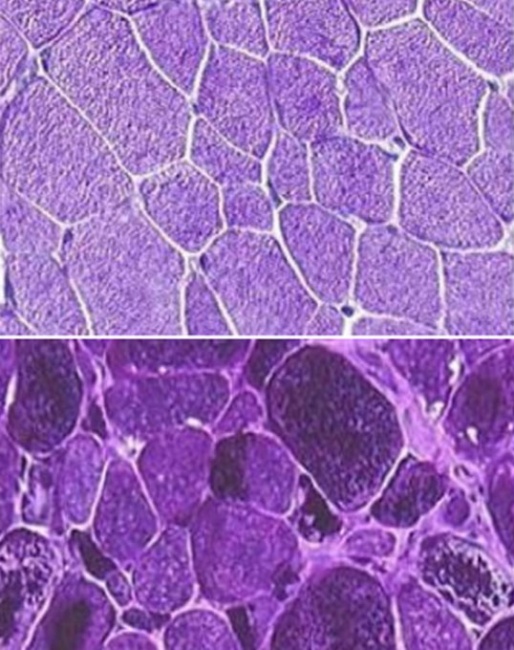
-- as reported in the WBFSH State of the Industry Report 2023
Definition PSSM Type 1
Polysaccharide Storage Myopathy (PSSM1) is caused by a genetic mutation in the glycogen synthase 1 gene (GYS1). Research has been conducted into this disease since 1995. Mutation occurs in many breeds that derive from continental Belgian breed crosses including Warmbloods. Thoroughbreds, Arabians and Standardbreds do not have the GYS1 mutation which causes PSSM1.
Clinical presentation
Horses with PSSM1 can have signs typically associated with tying-up, most commonly muscle stiffness, sweating, reluctant to move in conjunction with increased serum creatine kinase activity. There can also be symptoms present without exercise. During an episode, horses seem lazy, have shifting lameness, tense in abdomen and tremors in their flank and they may stretch out as if to urinate. The horses have painful, stiff and hard muscles, particularly in the hindquarters. Some horses will try pawing and rolling immediately after exercise.
Most PSSM1 affected horses have a history of many episodes of muscle stiffness which can be quote severe with the horse unable to stand and being uncomfortable when lying down. Some mildly affected horses might only have a few episodes a year. The urine of these horses is usually coffee coloured, due to muscle proteins released in the bloodstream and passed into the urine. This high concentration of proteins in the serum and urine can damage the horses’ kidneys if they become dehydrated.
Diagnosis is established by genetic testing of hair roots and muscle biopsy over 2 years of age, but definitive diagnosis requires genetic testing.
Pathology
PSS1 is characterised as the abnormal accumulation of the normal form of sugar stored in the muscle (glycogen) as well as an abnormal form of sugar (amylase-resistant polysaccharide). Classified as having a distinct genetic point mutation in the gene that codes for the skeletal muscle form of the glycogen synthase enzyme (GYS1) causing the enzyme to become overactive, resulting in a constant production of glycogen and resulting in a deficit of energy in the muscle cell. Quarter horses originally studied found that horses had 1.8-fold more glycogen (storage form of sugar) in their muscles, a deficit in energy when they exercised and persistent elevations in serum creatine kinase (CK) activity with exercise unless feed a lot starch high fat diet. Creatine kinase helps the muscles create energy, mostly found in the muscle and heart.
Genetic base
PSSM is a genetic disorder, it is an autosomal dominant trait. Only one parent needs to pass the genetic mutation on, so a 50% chance or greater that a PSSM1 horse’s offspring will develop the disease.
Treatment
Although PSSM1 can not be cured, through a diet and exercise regime the disease and its clinical presentation can be managed. Carbohydrates high in starch such as sweet feed, corn, wheat, oats, barley and molasses cause exacerbate PSSM1. Extra calories can be provided in the form of fat. Management is through daily exercise, enhancing glucose utilisation and improving energy metabolism in skeletal muscle. If diet only is changed about 50% of horses improve. If both diet and exercise altered, then 90% of horses have had no or few episodes of tying-up. But PSSM1 horses will always be susceptible to this condition if exercise routine is disrupted or if they become ill from other causes clinical signs can develop again.
Source: WBFSH State of the Industry Report 2023
Related Link
German Breed Societies Support Gene Research into PSSM2